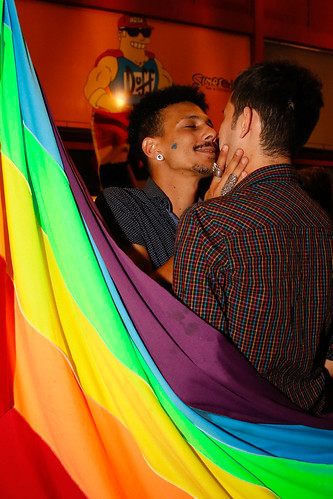ENCUESTA A COMUNIDAD LGBT
10-10-2014 – Hora da Virada contra a LGBTfobia nos bares do DF!

Transgender Violence Tracking Portal: One Year Later
Transgender Violence Tracking Portal: One Year Later
For the first time ever, there is a database where people the world over can see exactly what is happening to transgender people globally in terms of violent acts against them. The Transgender Violence Tracking Portal (TVTP) was launched earlier this year in the hope of accumulating as much data as possible in order to serve as a true resource and, ultimately, to put a stop to such acts in totality.
After six months of careful planning and a successful Kickstarter campaign, the portal was realized, up and running. Allison Woolbert, founder of TVTP, explained the need for this site in an interview with me last November:
So often, the media and law enforcement are dismissive concerning the violence that is inflicted on transgender/genderqueer/non-binary people. In addition, hate incidents against transgender people are often not documented at all. … Currently, there is no data repository that can validate and provide tangible evidence of the violence that has been inflicted on the transgender community. … With this project, the data will be available to be reported and queried against every day of the year. At any given point in time, we will have a website that can show the world what the picture of our community looks like and raise the awareness and the responsibility of law enforcement to protect our basic right to live.
TVTP released their first report to coincide with International Day Against Homophobia and Transphobia (IDAHOT) on May 17 of this year, revealing 103 reports of transgender murders, 14 violent incidents and three silicone-related harms between Jan. 1 and May 1. (These statistics have been updated since the report was released.) While there were surely many more than just the aforementioned incidents during this time period, the data collection was off to a great start. Those statistics have now been cited by parents of transgender children as well as numerous news outlets, as follows:
Debi Jackson’s Speech
Debi Jackson, the mother of a trans* daughter, spoke out about a nondiscrimination ordinance in Kansas City, Missouri, earlier this year. Jackson explained to TVTP:
In a recent contentious fight to pass an LGBT-inclusive non-discrimination ordinance in Roeland Park, KS, opponents continually inferred there would be a danger to women and young girls in restrooms and changing rooms if transgender women were allowed inside. I was able to use the report from the TVTP regarding violence in the first quarter of 2014 in conjunction with a Google search of “attacks in restrooms” during the same time period to show data that violence against transgender individuals is a real concern, while the very few instances of violence reported in restrooms was committed by heterosexual cis men. Once those facts were laid out during a public comment session, the bathroom danger argument was never mentioned by opponents again.
In a July 2014 post on Time.com entitled “Man Arrested for Stabbing Transgender Teen on D.C. Metro,” author Melissa Hellman wrote:
The attack comes shortly after a report released by Trans Violence Tracking Portal (TVTP), revealed that 102 transgender people were murdered in 12 countries from January to April this year. Allison Woolbert, the founder of TVTP, says an antitransgender stigma has led to a disproportionate rate of violence against transgender people in 2014.
In an August 2014 post on PBS.org entitled “When enforcing gender norms turns violent,” author Ivette Feliciano wrote:
Between January and April [2014], there were more than 100 acts of violence against transgender people in 14 countries, Transgender Violence Tracking Portal reported. In one instance, the database reports, a 14-year-old was strangled and stuffed under a bed.
Since March 2014, 1,935 incidents of murder spanning dates from 1970 to 2014 have been reported through the TVTP, as well as the following:
- 97 incidents of violence
- 18 suicides
- Four suspicious deaths
- Eight silicone-injection-related deaths
- Six missing persons
To date, TVTP has 2,164 backlogged articles and news reports of murders and violent acts against trans* people. A team of 47 researchers and five administrators is hard at work accumulating this important data to input into the system, with the help of the public. Woolbert has spearheaded these efforts, which also include kicking off a student service-learning project with Stockton College in New Jersey; participants will raise awareness on their campus, investigate cases and provide insight for the school about trans* violence.
The TVTP site itself gives individuals the power to report stories of violence against members of the trans* community themselves; you do not have to be affiliated with an organization or the like to report. The more incidents are reported, the better the tracking; the better the tracking, the more aware local, national and global communities can be regarding these statistics. At the end of the day, knowledge is power, and violence can be deterred with said knowledge.
Looking forward, Woolbert has big plans for the next six months, during which time the TVTP will be expanding search-engine capabilities to include a plethora of languages. She noted:
We also want to provide better educational resources for those that need them, continue to build national and international partners who are interested in reducing violence, and increase prosecutions against those who perpetrate crimes and harassment against us.
There are many opportunities to become involved with TVTP, including sharing stories from the site to continue to raise awareness, and volunteering with TVTP. As always, reporting incidents is key, and anyone who is aware of a violent act against a transgender individual is encouraged to report it to the TVTP through a simple online form.
For more information about the Transgender Violence Tracking Portal, please visit transviolencetracker.org.
Every Vote Counts: 25 Days Until Election Day
Every Vote Counts: 25 Days Until Election Day

With 25 days until Election Day, every vote, and every volunteer, counts.
HRC.org
Kansas Supreme Court Issues Temporary Stay on Gay Marriages, Hearing Set for November
Kansas Supreme Court Issues Temporary Stay on Gay Marriages, Hearing Set for November
In response to a district judge’s order on Wednesday, a marriage license was issued to a same-sex couple in Johnson County, Kansas earlier today – the state’s most populous county. The news prompted Kansas Attorney General Derek Schmidt to ask the state Supreme Court to intervene and halt counties from issuing more licenses to same-sex couples.
Now it appears the couple who obtained the license will be the only same-sex married couple in the state for now.
The Associated Press reports:
The state Supreme Court cited federal court rulings against gay marriage bans in its brief order but blocked Moriarty’s order in Johnson County, “in the interest of establishing statewide consistency.” It set a hearing for Nov. 6 and said it would consider whether the state’s ban on gay marriage is permissible under the U.S. Constitution.
The Johnson County newlyweds, Kelli and Angela, asked to be identified only by their first names to help protect their privacy, but did agree to allow a photograph of them after the ceremony to be used. In a statement released through the gay-rights group Equality Kansas, they said they wanted to celebrate privately.
Kyler Geoffroy
Performance at a LGBT PAGAENT CHOREO BY VIISIION
Performance at a LGBT PAGAENT CHOREO BY VIISIION
LGBT CARRIBEAN MISS USA PAGAENT CONTESTANT PERFORMANCE CHOTEOGRAPHED AND DIRECTED BY VIISIION.
BREAKING: North Carolina Now Has Marriage Equality
Lashes Off! Behind the Scenes With Bob the Drag Queen (VIDEO)
Lashes Off! Behind the Scenes With Bob the Drag Queen (VIDEO)
In a new Web series I sit down to chat with notable drag queen personalities. In this clip I interview Bob the Drag Queen.
WATCH:
Follow Bob the Drag Queen on Twitter @bobthedragqueen.
Marriage Momentum
Oops! James Franco Accidentally Posted A Dick Pic
Oops! James Franco Accidentally Posted A Dick Pic
Or did he? That’s the question that’s burning on the minds of Queerty’s editorial staff. Please reserve your judgements for the comments section, but hey, if you made it this far, that means you’re curious just like us.
This tip (just the tip) came via Gawker, where the diligent staff takes a much-needed closer look at one of the pictures James put up on his Instagram last weekend:
Not convinced? Gawker’s art director worked some magic to give you a clearer look:

There’s definitely something resting on James’ thigh, and we’re really on the fence here whether or not he’s flashing some peen.
Ever the investigative sleuths, Gawker went a step further to imagine the position he’d have to be in to achieve the shot:

What do you think? Is James showing off his franco or is it just time for us all to clock out for the weekend?
Dan Tracer

